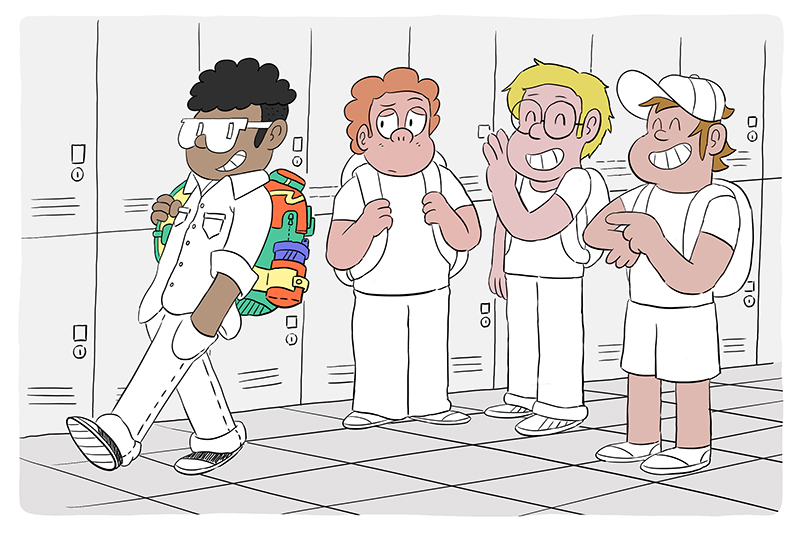
João had great success as a youth player in Brazil, where he grew up. When he came to live in the Netherlands, he also immediately joined a soccer club. When João joined his first team, he was just a basic player. His friends at school liked him and they also enjoyed helping him get started in a new country. It’s all getting used to for João and at school it’s not easy. But he can let his feet do the talking and at least he is doing something right!
He is quick with the ball and goal-oriented. After a year he was scouted by a first division club. They invited him to play there in youth training at JO17. His parents also received some expenses from the club.
João is really extremely proud and he can’t wait to tell his friend Casper and others at school. He also got new clothes and was allowed by his parents to buy new sunglasses, so nice! “I really look the best out of everyone!”
Casper is a little startled by his friend. “How conceited João is acting today. He is parading around the schoolyard with his new clothes and sunglasses. It really looks like crap and the other boys are making fun of him. He really shouldn’t think he’s better than us! I’m going to tell him to stop that bullshit!”
The connection
João feels super proud and shows it clearly and then the boys start to get annoyed with him. Maybe they are a little jealous. But as you experienced, it is also culture. In the Netherlands there is an expression: ‘Act normal, you’ll be crazy enough’. People like it when you keep acting “normal,” or modest, even if you are successful. In Brazil, you share your success and people like to put you on a pedestal. They want to belong to you. In India, we know the same thing. We want to be the best, not just do our best. And also show it when we succeed.
In Scandinavian countries, this is called Jante’s Law (Janteloven), which states that you should not believe that you are better than us. The writer Aksel Sandemose immortalized this mentality by describing a small Danish town he called Jante. That sense of that head above the ground is quite extreme there and with us. We are not primarily motivated by success.
At least this slant has led to a society of solidarity. In general, the underdog is helped rather than the hero. In countries where success comes first, this is much less so. The winner takes everything. The loser gets another chance next time.
Not here. There is a lot of deliberation and searching for consensus so that we divide the pie as well as we can. Pretty drawn out and tiring sometimes. Everyone has to do their peeing. But for someone from a culture where that is not the case, it is often very frustrating. Make up your mind!
And now let’s hope Casper can explain to Jão that he too is very proud, but that in Holland we don’t shout it from the rooftops like that. Another beautiful expression.
In short
For Casper and friends:
- Accept that João comes from an achievement-oriented we society.
- Success is celebrated and, above all, shared.
- Create the opportunity to talk about celebrating success and explain that in the Netherlands people do not celebrate so lavishly.
- Be extra alert to the body language of successful ones, who do not brag but share.
- Enjoy the success with us.
For João:
- Accept that in Holland, a successful person is not a hero.
- The successful person who acts modestly is most admired.
- You can also celebrate success by having a beer with your friends and not necessarily by showing off stuff.
- Above all, ask your questions. The Dutch are used to being addressed directly.
Want to read more about culture dimensions?
Important to know:
This anecdote is based on stories shared with us. Connect2Us strives to highlight the dilemma from both sides and not to label people or suggest that one or the other should behave differently. We see in our daily intercultural work that awareness by those involved is enough to move toward each other without pretending to be very different. Connect2Us aims to help readers recognize and avoid prejudice. Read about prejudice, discrimination and racism here.

